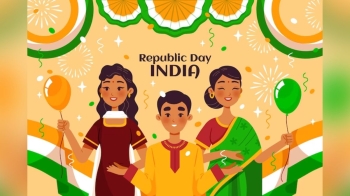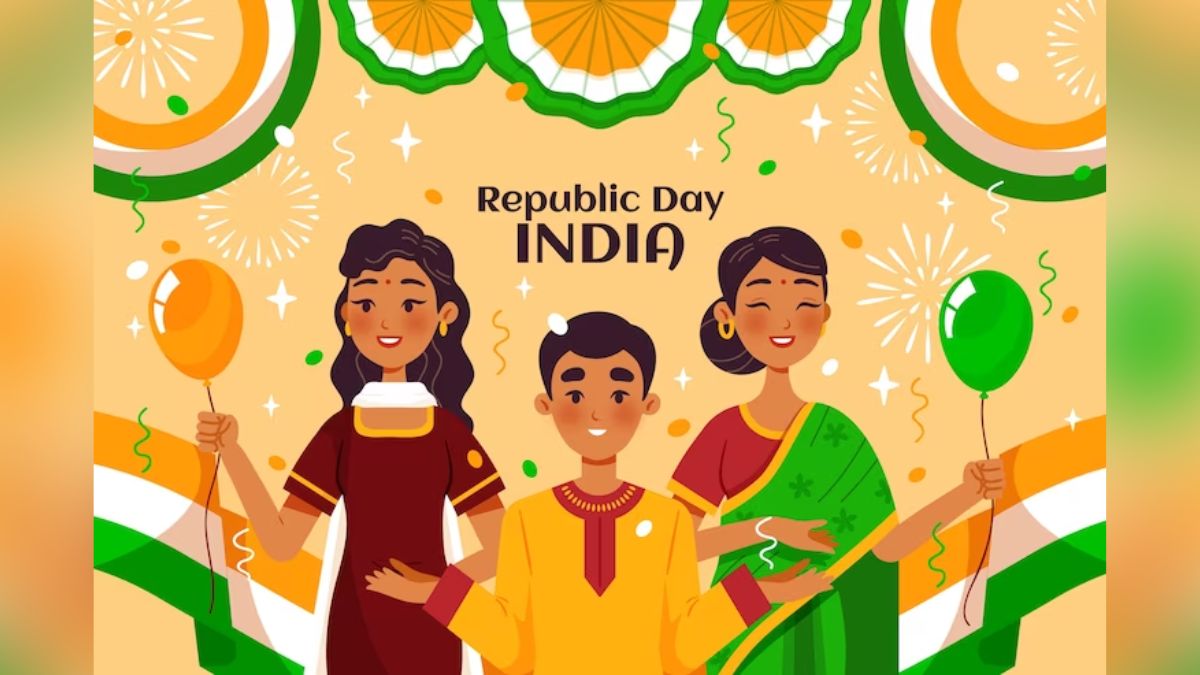
.png) Jacob Peenikaparambil
Jacob Peenikaparambil

Republic Day celebration in India has become an exhibition of India’s military might with the display of the latest arms, weapons, tanks, warplanes, etc. The content of the speeches of most of the political leaders on the Republic Day is jingoism. Instead of showcasing the military might of India, the Republic Day should be devoted to celebrate the ideals enshrined in the Constitution and to educate people about its beauty, richness and relevance. It should also be a day for introspection -- how far the vision and goals of India, as laid down in the preamble of the Indian Constitution, are being realized.
The preamble of the Constitution is not a mere introduction, but it is a sublime document depicting the vision of an inclusive India. The freedom fighters’ aim was not only to liberate India from the clutches of the British, but to build an India based on its civilizational ethos, integrating the liberal and humanistic ideals of a modern state. The members of the Constituent Assembly captured the dreams of the freedom fighters and of the people of India, and created a vision in the form of the preamble. It consists of the vision and goals of an inclusive, harmonious, progressive and prosperous India.
|
WE PEOPLE OF INDIA, having solemnly resolved to constitute India into a SOVEREIGN SOCIALIST SECULAR DEMOCRATIC REPUBLIC] and to secure to all its citizens: |
Vision of India
The vision of India is not based on a particular religion, race or caste, but it is broad, inclusive and people-centred. The preamble begins as “We the people of India…” It means that the sovereignty of India lies with the people and not in a king or a ruler. The state derives all its powers from the people and the state exists for the people. Hence it is accountable to the people and not the other way, as some right-wing ideologues claim.
The second dimension of the vision is inclusiveness and pluralism as expressed in the term, “secularism”. Secularism is a much-abused and misinterpreted term by the sick-minded people. In the context of India, secularism means pluralism -- Sarva Dharma Samabhav. It also means that the state should have no religion of its own, all religions are equal and the state should not discriminate against any citizen based on religion. Article No. 25 grants freedom to its citizens to profess, preach and practice any religion of their choice. Secularism is not a western concept as alleged by the right-wing groups, but it is in tune with India's civilizational ethos of Vasudhaiva Kutumbakam (the whole world is a family) and ekam sat vipra bahuda vadnati (There is only one truth and learned people call it by many names). It goes with the millennial heritage of India -- unity in diversity.
The third dimension of the vision is captured in the term “socialism”. It refers to promoting social change and transformation to end all forms of inequalities. It also means preventing concentration of wealth and power in a few hands, and the state playing an important role in the economic development of the country.
The fourth dimension of the vision is explained in the term “democracy”. The vision of India envisages people electing the rulers of the country and the elected representatives remaining accountable to people. The essential elements of democracy are rule of law, inalienable rights of citizens, independence of the judiciary, free and fair elections and freedom of the press, and the freedom to dissent.
Goals of India
In order to realize the vision, specific goals are to be set. The preamble contains six specific goals: securing JUSTICE, LIBERTY, EQUALITY, FRATERNITY AND individual’s DIGNITY along with nation’s UNITY and INTEGRITY. All these goals are interrelated.
Justice: Securing social, economic and political justice to all citizens of India is an important goal as per the constitution of India. Political freedom has to be instrumental to create a new social order, based on socio-economic justice. Justice to all is essential to realize a just and egalitarian society. Part IV, V and VI of the Constitution deals with the structure of the judiciary and the process to access justice.
Social justice means greater good for a larger number of people and all should be treated equally. The Indian constitution visualizes socio-economic justice as incorporated under Directive Principles of state policy. Economic justice means providing economic opportunity, economic equality and removing economic disabilities. Political Justice means a system free from political arbitrariness so that there should be political fairness in the working of the government. Every law should be equally applicable to every person irrespective of his political status.
Liberty: Ensuring lliberty of thought, ex
Equality: Another important goal of the Constitution is guaranteeing equality of status and opportunity to every citizen for the development of the best in him/her. It means that discrimination in any form is not to be tolerated. As per Article 17 & 18, untouchability is abolished in India and its practice is punishable by law.
Fraternity: Fraternity that stands for the spirit of common brotherhood/sisterhood among all the people of India is a significant goal of the Constitution. In order to foster fraternity, pluralism or unity in diversity is needed. Hate speeches and hate messages violate fraternity.
Individual Dignity and Integrity of the Nation is a very important goal of the Constitution. It ensures equal participation of every individual in all the processes of democratic governance. It also means that unity should not be at the cost of individual dignity. There should be balance between individual dignity and efforts for unity. All citizens are expected to contribute to the unity and integrity of India. Understanding and harmony among different sections of the society is essential for maintaining unity. Imposing laws and policies on people disturbs unity.
Two Conflicting Visions
At the time of Independence, there existed two visions of India: one envisaged by the Constituent Assembly and captured in the preamble of the Constitution and the other based on the Hindutva of the Hindu Maha Sabha and the Rastriya Swayamsevak Sangh (RSS). The latter is exclusive, hierarchical and patriarchal. Shashi Tharoor in his book, “Why I am a Hindu”, has summarized the Hindutva vision in the following words. “Hindutva rests on the atavistic belief that India has been the land of Hindus since ancient times and that their identity and its identity are intertwined. Non-Hindus can be tolerated depending on their loyalty to the land, but cannot be treated as equal to Hindus unless they acknowledge the superiority of Hindus in India and adopt Hindu traditions and culture. Non-Hindus must acknowledge their Hindu parentage, or better still, convert to Hinduism in a return to their true cultural roots”.
The main protagonists of Hindutva vision are V.D. Savarkar and M.S. Golwalkar, the second Sarsangchalak of RSS. The Hindutva vision is based on four sources: 1) “Hindutva, Who is a Hindu” by V.D.Savarkar, 2) “We or Our Nationhood Defined” and 3) “Bunch of Thoughts” by M.S. Golwalkar and 4) “Manu Smriti”, the ancient Hindu law book. According to Golwalkar, the minorities, Muslims and Christians, have to become either Hindus or remain in India without any rights or privileges, including citizenship right.
The Hindutva vision of India, which was limited to a small group, began to be accepted gradually by more and more people due to the relentless work of RSS and its more than 70 allied organizations like Bhartiya Janata Party (BJP), Vishwa Hindu Parishad (VHP) Bajrang Dal, Akhil Bhartiya Vidyarthi Parishad (ABVP), Bhartiya Mazdoor Sangh (BMS), Seva Bharati, Vidya Bharati, etc. The Sangh Parivar adopted a strategy of polarizing the Hindus by presenting Muslims and Christians as enemies of the nation. Ram Mandir in Ayodhya, cow slaughter, forced conversion, love jihad, hijab, etc. are some of the issues raked up and employed in the process of polarization. Profuse use of social media for spreading hatred against the minorities through fake messages was another efficient means used for pitting minorities against the Hindus. The final result was BJP capturing power at the Centre with absolute majority in the Lok Sabha in 2014 and its robust victory in 2019.
The failure of the Congress party to hold on to the core values of the Constitution and negligence to educate people about the Constitution and secular democracy led to its emaciation and rout in the general elections in 2014 and 2019.
Restoring Original Vision
The eight years of rule by the BJP has done a lot of damage to the inclusive vision of India. India today is characterized by hatred and division, a shocking divide between the rich and the poor as reflected in the Oxfam report 2023, soaring unemployment, flagging all democratic institutions and rampant use of draconian laws to silence dissent. As a conclusion to his book, “Modi’s India”, Christophe Jaffrelot writes that an electoral defeat of the BJP may not alone be enough “to puncture the BJP’s resolute march toward crafting a new hegemony”. “The Sangh Parivar is so deeply entrenched in the social fabric that it may continue to dictate terms to the state on the ground -- and rule the street”.
Thus, the original vision of India -- an inclusive, liberal, harmonious, egalitarian and secular democracy -- as delineated in the preamble of the Constitution, is in tatters. Celebration of Republic Day 2023 is a wakeup call to all Indians to reassert and restore the original vision of India by “opening shops of love in the market of hatred”.